In the 1826 elections in Pennsylvania, a tie vote occurred in the 2nd district . As a result, no candidate won in that district and a special election was held on October 9, 1827. [1]
| Elections in Pennsylvania |
|---|
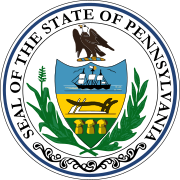 |
In the 1826 elections in Pennsylvania, a tie vote occurred in the 2nd district . As a result, no candidate won in that district and a special election was held on October 9, 1827. [1]
| Candidate | Party | Votes [1] | Percent |
|---|---|---|---|
| John Sergeant | Anti-Jacksonian | 2,702 | 51.4% |
| Joseph Hemphill | Jacksonian | 2,557 | 48.6% |
Sergeant took his seat at the start of the First Session of the 20th Congress. His election was unsuccessfully contested. [2]
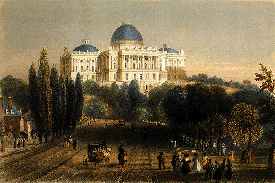
The 20th United States Congress was a meeting of the legislative branch of the United States federal government, consisting of the United States Senate and the United States House of Representatives. It met in Washington, D.C. from March 4, 1827, to March 4, 1829, during the third and fourth years of John Quincy Adams's presidency. The apportionment of seats in the House of Representatives was based on the Fourth Census of the United States in 1820. Both chambers had a Jacksonian majority.
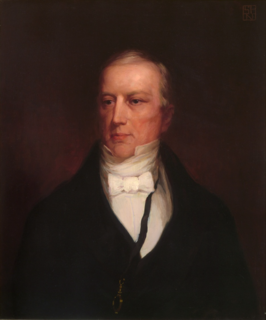
In the 1828 and 1829 United States House of Representatives elections, while Jacksonians soundly took control of the presidency, with Andrew Jackson's victory, they greatly increased their majority in Congress. Outgoing President John Quincy Adams's unpopularity played a major role in the Jacksonian pick-up, as did the perception of the Anti-Jacksonian Party as urban and elitist. Major increases in suffrage also heightened Jacksonian wins, as newly enfranchised voters tended to associate with Jacksonian principles. The Anti-Masonic Party, a single issue faction based on distrust of Freemasonry, became the first third party in American history to garner seats in the House.

The 1826 and 1827 United States House of Representatives elections were held at various dates in each state in 1826 and 1827 during John Quincy Adams's presidency.
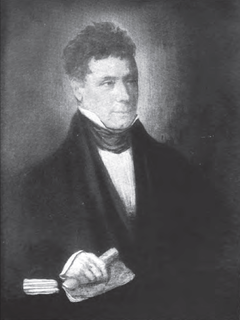
William Creighton Jr. was the 1st Secretary of State of Ohio, a United States Representative from Ohio and a United States District Judge of the United States District Court for the District of Ohio.
John Chamberlain Clark was a United States Representative from New York.
The 1826 and 1827 United States Senate elections were elections that had the majority Jacksonians gain a seat in the United States Senate.

The 1826 United States House of Representatives elections in New York were held from November 6 to 8, 1826, to elect 34 U.S. Representatives to represent the State of New York in the United States House of Representatives of the 20th United States Congress.

On May 15, 1820, David Fullerton (DR) of Pennsylvania's 5th district resigned from his seat in the House of Representatives. A special election was held on October 10, 1820 to fill the resulting vacancy. This election was held on the same day as the election for the 17th Congress.

On August 26, 1825, before the first session of the 19th Congress began, James Allison, Jr. (J) of Pennsylvania's 16th district resigned. A special election was held to fill the resulting vacancy.

On January 12, 1826, Patrick Farrelly (J) of Pennsylvania's 18th district died in office. A special election was held to fill the resulting vacancy

On May 1, 1826, Alexander Thomson (J) of Pennsylvania's 13th district resigned. A special election was held to fill the resulting vacancy on October 10, 1826, the same day as the general elections to the 20th Congress.

At some point in 1826, Joseph Hemphill (J) of Pennsylvania's 2nd district resigned from Congress. A special election was held to fill the resulting vacancy.

On August 14, 1826, Henry Wilson (J) of Pennsylvania's 7th district died. A special election was held to fill the resulting vacancy on October 10, 1826.

On December 15, 1829, a special election was held in Pennsylvania's 16th congressional district to fill a vacancy caused by the resignation of Representative-elect William Wilkins (AM) on November 9, 1829, prior to the start of the 21st Congress.

Missouri elected its representative to the United States House of Representatives for the 1828–1830 term on August 4, 1828.
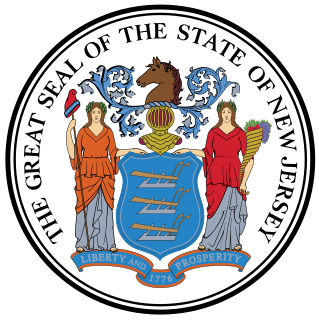
New Jersey elected its members November 4, 1828.

New Hampshire elected its members March 10, 1829 after the term began but before Congress convened.
A special election was held in Maine's 1st congressional district on September 27, 1827 to fill a vacancy left by the death of William Burleigh (A) on July 2, 1827